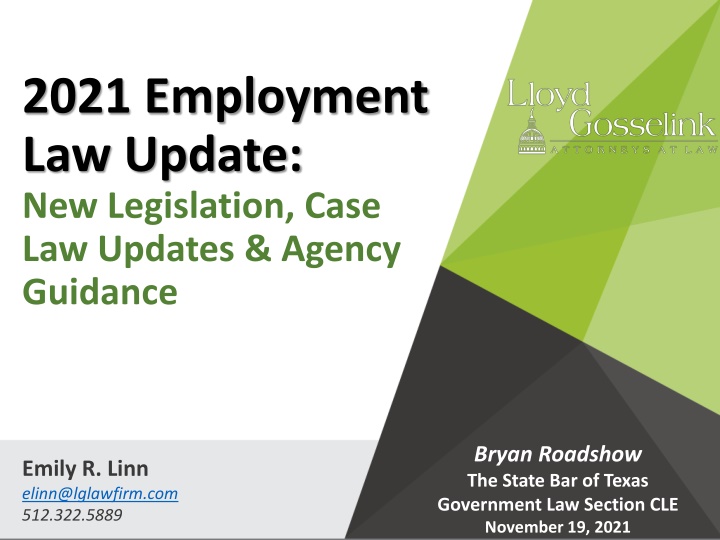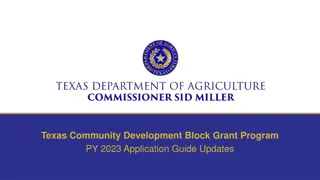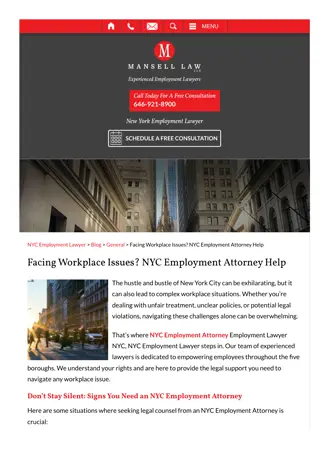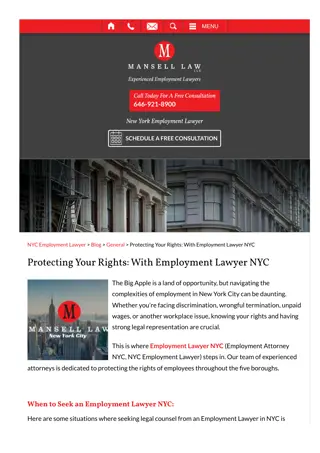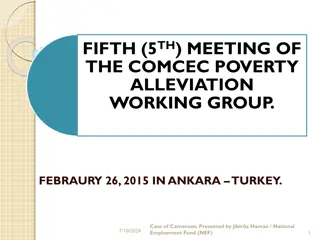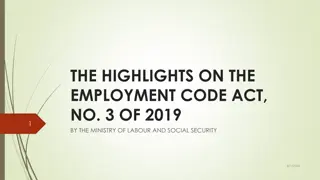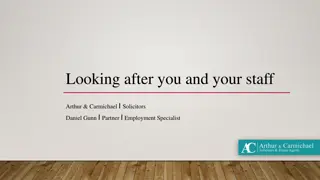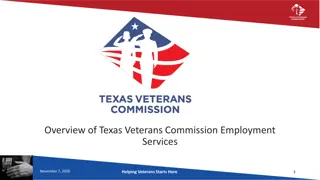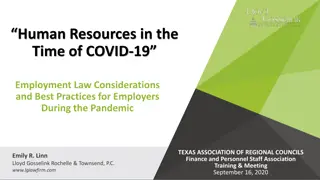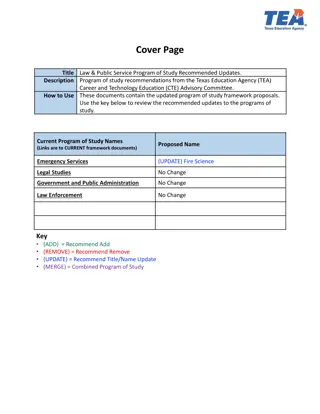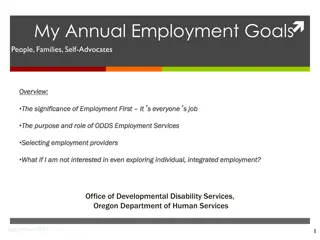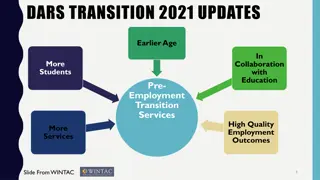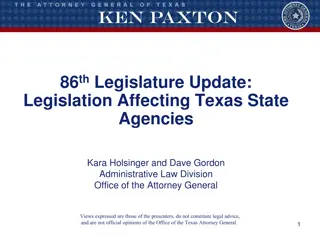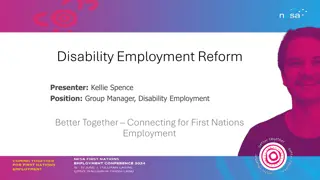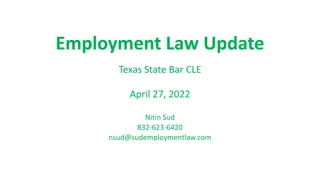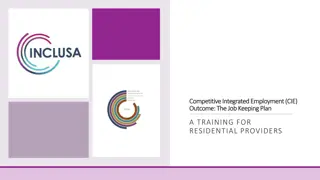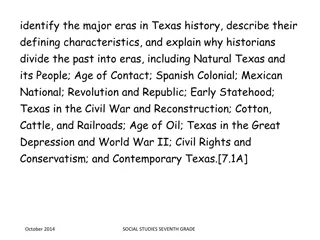Recent Employment Law Updates in Texas
Significant updates in Texas employment law include an extension of the statute of limitations for filing sexual harassment complaints, expansion of liability for sexual harassment, prohibition on state-funded settlements for individuals, and restrictions on businesses requiring vaccination certification. The changes also affect paid leave entitlements for military service and open carry of firearms. Moreover, new provisions address personal liability for supervisors failing to address harassment and restrictions on public money use for settling harassment claims against government officials.
Download Presentation

Please find below an Image/Link to download the presentation.
The content on the website is provided AS IS for your information and personal use only. It may not be sold, licensed, or shared on other websites without obtaining consent from the author.If you encounter any issues during the download, it is possible that the publisher has removed the file from their server.
You are allowed to download the files provided on this website for personal or commercial use, subject to the condition that they are used lawfully. All files are the property of their respective owners.
The content on the website is provided AS IS for your information and personal use only. It may not be sold, licensed, or shared on other websites without obtaining consent from the author.
E N D
Presentation Transcript
2021 Employment Law Update: New Legislation, Case Law Updates & Agency Guidance Bryan Roadshow The State Bar of Texas Government Law Section CLE November 19, 2021 Emily R. Linn elinn@lglawfirm.com 512.322.5889
Expansion of statute of limitations for sexual harassment claims Expansion of liability for sexual harassment Prohibition on state-funded sexual harassment settlements for individuals Prohibition on businesses requiring certification of vaccine status (not applicable to employers) Expansion of paid leave entitlements for military service Open, unlicensed carry of firearms
Extends the statute of limitations for filing sexual harassment complaints with the Texas Workforce Commission to 300 days after the date when the misconduct allegedly occurred. Expansion from 180 days Complaints with EEOC must also be filed within 300 days Failure to file an administrative complaint with the TWC or the EEOC means the employee failed to exhaust their administrative remedies and cannot bring a lawsuit.
Establishes that sexual harassment by any employer, regardless of how many persons they employ, is unlawful. All governmental entities, including cities and counties, are covered by TCHRA anyways, so no added liability in this provision. Creates personal liability for agents and supervisors who do not take immediate and appropriate corrective action if they know or should know that sexual harassment is occurring.
Prohibits the appropriation of money to settle or pay for a sexual harassment claim made against members of the executive, legislative, or judicial branch of state government. A political subdivision may not use public money to settle or otherwise pay a sexual harassment claim made against a person who is: (1) an elected or appointed member of the governing body of the political subdivision; or (2) an officer or employee of the political subdivision. This bill should be read in conjunction with SB 45, which creates personal liability Questions regarding: What it means to settle or pay How to structure settlements going forward
Prohibits businesses from requiring customers to certify their COVID-19 vaccination status as a condition of entering or interacting with the business. Does not impact vaccine policies of employers with respect to employees. BUT Governor Abbott s Executive Order 39 & 40 prohibit all entities from enforcing vaccine mandates, with specific mention of employees.
Entitles public officers and employees up to seven days of paid leave for those engaged in military service in response to a federally declared disaster. This leave is in addition to the paid leave provided for authorized training or duty otherwise authorized or ordered. During a leave of absence provided under these provisions, the person may not be subjected to loss of time, efficiency rating, personal time, sick leave, or vacation time.
Allows law-abiding individuals age 21+ to carry a handgun openly (in a holster) or concealed in non-prohibited places without having to obtain a license to carry. Repeals the requirement that an otherwise eligible person must have a license in order to carry a handgun in Texas. Does not amend any portion of the codes in a way that affects an employer s ability to prohibit employees from carrying on work premises. No change to personnel policies necessary. Political subdivision can continue to prohibit handgun carry at open meetings, so long as include proper postings/signage.
Biden campaign website noted desire to increase EEOC sbudget and empower the EEOC to initiate investigations for all areas of discrimination under its purview. Likely to renew focus on pay equity and misclassification, temporary workers, and the gig economy. May focus more on LGBTQ+ rights. May issue enforcement guidance on sexual harassment prevention. May see increased focus on disability and reasonable accommodation issues, in light of COVID-19.
U.S. is one of only 11 countries that still doesnt guarantee workers paid sick leave. Based on Biden s Build Back Better framework, House proposed social spending bill known as the Build Back Better Act . 12 weeks of paid family and sick leave available to most workers, including public/private employees, self-employed and gig workers. Qualifying reasons for paid leave identical to FMLA. Three days of paid bereavement leave for death of immediate family member. Status of Paid Leave bill: Paid leave was originally cut out altogether. On November 3, Speaker Pelosi announced four weeks of paid leave added back into proposed bill. Negotiations are ongoing, need unanimous support from Senate democrats.
Goal is to raise awareness of retaliation issues when workers exercise their protected labor rights. DOL, NLRB, EEOC will collaborate to protect workers on issues of unlawful retaliatory conduct, educate the public and engage with employers, business orgs, labor orgs and civil rights groups in coming year. Initiative Launches Nov. 17, 2021. Issued in the wake of new OSHA rules requiring vaccinations and Biden s request that employees report employer non-compliance.
Badgerow, a financial advisor, complained she was not sure if she was not treated fairly because she was not family or because she is a woman. Court held this was protected activity. Fired the same day the company learned of the statement. Company claimed terminated because of stress of dealing with constant complaints about Badgerow from coworkers. Court noted that Badgerow s supervisor had received complaints from coworkers for months, but it wasn t until he learned of Badgerow s comments that he terminated her. Court held this was evidence of pretext. Take away: (1) Complaints that even reference a protected class may be protected activity. (2) Inconsistent treatment of performance issues can be evidence of pretext.
Yowell was a railroad employee who was injured on the job. Employees were required to report any on the job injury immediately, no matter how small, but during investigation, became clear Yowell did not report his injury until about a week after it occurred and initially lied about the timing. Terminated for failure to follow reporting policy. Case under Fed. Railroad Safety Act, but legal standard is similar. Under this law, reporting an injury is protected activity. Take away: when an employee engages in protected activity, the employee is not insulated from appropriate discipline for misconduct that becomes known to the employer in the course of responding to the employee's protected activity.
Long term employees performance began to decline, ultimately resulting in her termination based on difficulties communicating and disorganization, as well as lack of effort to correct the behavior. Dispute over whether the Hospital s proffered reasons for termination were true, or a pretext for age discrimination. Salazar claimed the Hospital did not follow its progressive discipline policy in some cases, this can be evidence of pretext, such as in attempts to paper the file after the fact. Court disagreed found the Hospital generally followed its evaluation process, and that its progressive discipline policy explicitly provides for the use of discretion. Take away: maintaining performance documentation that does not candy coat issues will support adverse actions and a flexible discipline policy allows discretion to handle issues ad hoc.
Police Chief terminated for violating confidentiality order related to investigation and for other problems in her relationship with the City Manager. Months passed between the time Childress violated the order and her actual termination, which she alleged was evidence of pretext. Court agreed if employee s action is so irreparable that they should be terminated, waiting months to do it does not make sense. Take away: address performance issues in writing when they happen.
Employee hospitalized for stomach issues necessitating surgery and long recovery time. Exhausted FMLA and used maximum amount of paid leave from sick leave pool. TxDOT had discretionary LWOP that allowed up to one year of unpaid leave, but TxDOT denied Lara s request for LWOP and terminated his employment after five months of leave. Argued that because Lara did not follow TxDOT s formal procedure to apply for LWOP, was not entitled to it. Court disagreed Law is clear that a request for an accommodation need not be formal and imposing fine print requirements would subvert TCHRA s purpose. Take away: don t forget that an extension of unpaid leave for a definite period of time may be a reasonable accommodation under the ADA and/or TCHRA, and that employees need not make a formal request.
Law requires accurate time records Consider remote work tracking challenges Reasonable diligence DOL audits looking at log-in and email times Watch out for dedicated employees
Obligation to ensure remote employees are properly tracking time worked. Having a written policy is not enough if knew or should have known of the work, obligation to pay employee for time spent.
Work from home business expenses may not bring rate below minimum wage. Recommend: pay all business expenses to enable employees to do work.
May be a reasonable accommodation under ADA to permit flexible work schedules. Should have written policy that outlines Specifics of when allowed How to request Any other requirements
No Pressure Not Otherwise Employed To Do Same Type of Services Civic/Charitable Purpose May not waive or volunteer to work overtime
Employer must provide reasonable accommodation for the religious belief unless it would pose an undue hardship. Assume request for religious belief is sincerely held unless objective basis for questioning either the religious nature or sincerity of belief, then can request additional supporting information. Undue Hardship under Title VII is a lesser standard than under ADA. Considered to be more than a de minimis cost or burden to the employer. This is a LOW BAR. Considerations include direct monetary costs and burden employer s business, including risk of the spread of COVID-19 to other employees or public.
Can discontinue previously granted accommodation if no longer for religious purposes, or accommodation later poses an undue hardship. Objections based on social, political, or personal preferences, or on non-religious concerns, do not trigger Title VII requirements.
Many unvaccinated people who are infected with COVID-19 will have persistent symptoms lasting at least one month. Some have symptoms that last more than a year. Most common symptoms are headaches, fatigue, brain fog, and shortness of breath. Can happen after severe and mild infections, in both old and young people. The cause is unclear; research being conducted.
July 26, 2021 joint Department of Justice and Health and Human Services guidance: Long COVID can be a disability if it substantially limits one or more major life activities. Substantially limits is construed broadly; the impairment need not prevent or significantly restrict the activity and limitations do not need to be severe, permanent, or long-term. Triggers obligation to engage in interactive process under ADA.
Is COVID-19 a serious health condition? Overnight stay in a hospital or other medical facility Conditions which incapacitate the employee or employee s family member for more than three consecutive days and involve ongoing medical treatment Either multiple appointments with a health care provider or a single appointment and follow-up care, such as prescription medication Chronic conditions that cause occasional periods when the employee or their family member is incapacitated, and which require treatment by a health care provider at least twice a year
THANK YOU! elinn@lglawfirm.com Office Direct Line: 512.322.5889 Cell: 214.755.9433 www.lglawfirm.com
